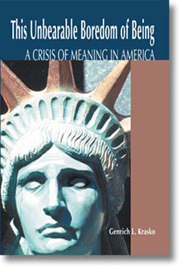FOREWORD
This book is a precious gift to the reader. The author guides the reader in a truly universalist spirit, that allows us, in his company, to view the present state of our culture both in depth as well as in a critical manner. I myself, as a European, could of course learn a lot, gaining new information and correcting many previous misinterpretations. Small wonder: the author is a well-recognized scientist who migrated from one world and landed in another one. Hence he could accumulate a wealth of experience, and present it in the light of his personal wisdom.
Having read the manuscript of this book, I found Genrich Krasko a sensitive, warm, and concerned man. He presents a sweeping, if very personal, view of how our society should, and in his opinion could, function. In this effort he does not heed the frontier lines between the political "right" and "left." Even more, by taking a non-conformist stance he positively invites criticism from both sides, taking them a necessary—if not sufficient—condition of being right.
Being well-versed in a wide range of sciences, the author expertly guides the reader through a series of rich and promising vistas, which for the sake of his granddaughter he wishes eventually to come true. Thus, starting out from an eminently personal motive, he finds formulations that really speak to the needs of the present time.
If this were a political book, I would not accept its dedication to me: I have always taken care to keep my brainchild, Logotherapy, out of the turmoil of political discussions. But it is, as I see it, simply a positive utopia in which ideas and values that have been dismissed or forgotten are brought to mind again, not in a moralistic or traditionalist manner, but after a critical "dusting" and with a new twist.
At one point in the book, the author refers to the importance of having a role model. Well, I herewith congratulate the readers—and among them, in particular, the younger ones—for, in this very respect, being given a chance by taking up this book and devoting themselves to its careful—and fruitful—study.
Viktor E. Frankl Vienna, June 1997
